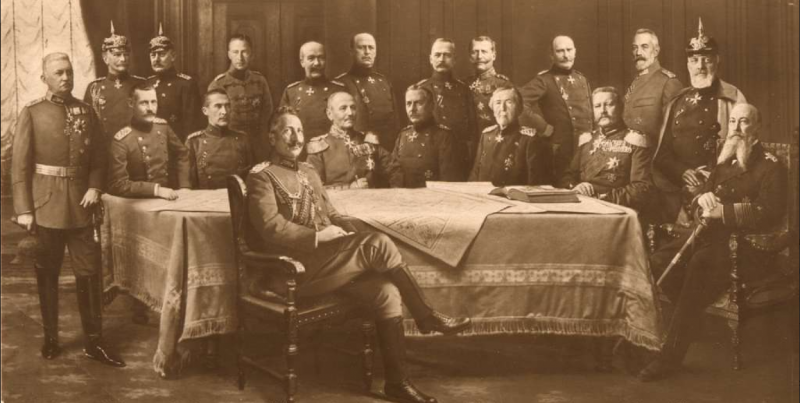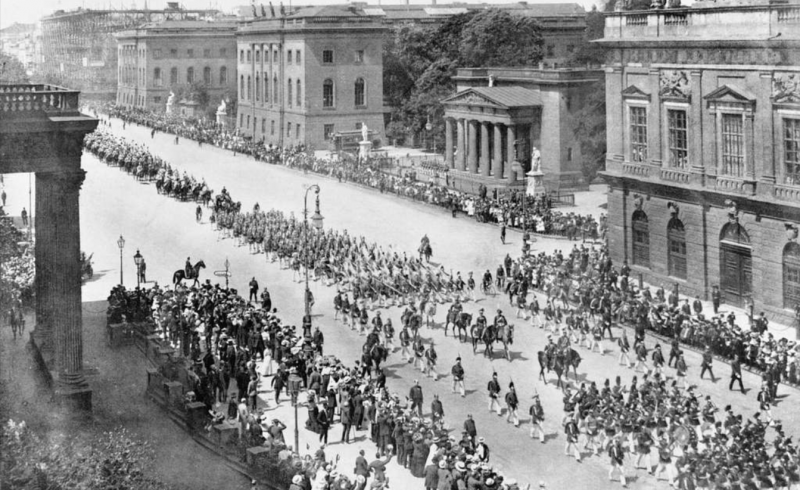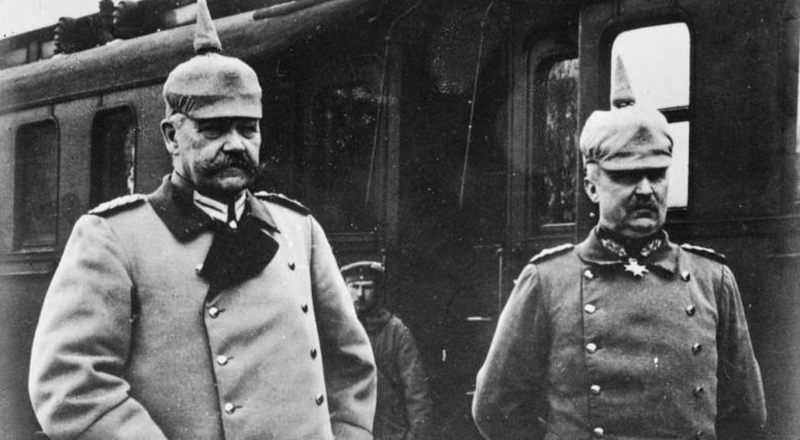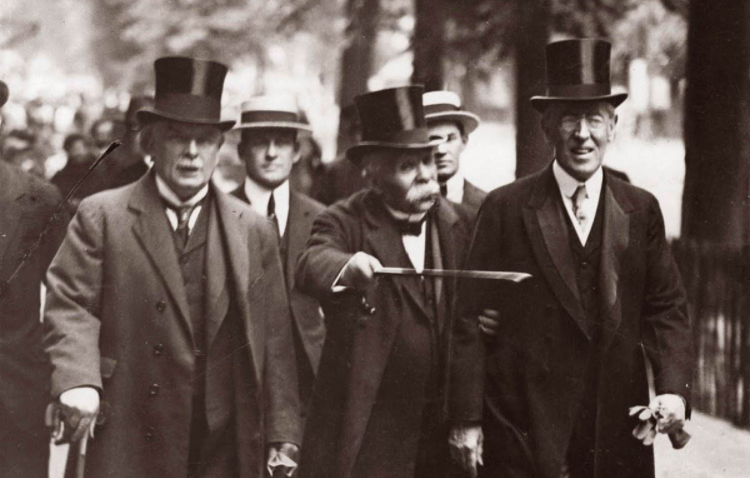"The fall into the deepest abyss": the collapse of the Second Reich and the democratization of Germany under the supervision of the Entente countries

The First World War, which exacerbated social and economic contradictions in the countries participating in this conflict, led to the collapse and disintegration of four empires - Russian, German, Austro-Hungarian and Ottoman, which was accompanied by revolutions and the creation of new states.
Entry into the war caused a surge of enthusiasm in German society - a feeling of breathtaking change and confidence in an early victory were widespread. The Germans hoped for exceptionally favorable peace conditions for the country. The final defeat and harsh terms of the Treaty of Versailles came as a shock to the Germans, many of whom were convinced that the war had been lost not by the German army, but by politicians who had stabbed the nation in the back.
Why did Germany lose the war? Why was there a widespread opinion among the Germans about the "stab in the back"? Why did the Germans, after the conclusion of the Treaty of Versailles, consider themselves deceived? What caused the growth of revanchist sentiment after the announcement of the results of the First World War? These are the questions we will try to answer in this article.
The question of responsibility for the outbreak of the First World War

Military parade in Berlin shortly before the First World War.
Historian Oleg Yuryevich Plenkov in his fundamental work “The Catastrophe of 1933. german story and the rise of the Nazis to power” notes that with regard to the causes of the First World War, the judgment is especially true that historians sometimes cannot explain even a specific event with reliable accuracy [1]. The reason is that the available data are not so complete and unambiguous that their causal interpretation is beyond doubt.
For almost 100 years, the question of the role of the German Empire in unleashing the First World War has remained hotly debated. Historians from different countries expressed many opposing points of view. In Russia, the opinion about exclusively German wine usually dominates. This opinion is not connected with exact evidence and documentary evidence, but with moods and emotions, as well as with Germanophobia, which was widespread for most of the 1th century (especially after World War II) [XNUMX].
In 1961, the German historian Fritz Fischer's monograph "The Rush to World Domination" was published in Germany, which immediately became a world bestseller. It argued that Germany was solely to blame for the outbreak of the war. In the USSR, Fischer's works were immediately ranked among the most important works of the Western "academic trend" [2]. This is not surprising, because in the Soviet ideological context, his books were evaluated positively. Despite the fact that Fischer did a fairly serious job, his argument is not flawless, since he showed only one side of the coin - the development of Germany was, as it were, taken out of the European context. The Fischer school should be seen as part of the German national repentance that changed the country after 1945 [1].
The English historian Alan John Percival Taylor wrote in 1963:
The American historian Fritz Stern, in turn, noted that British selfishness and imperialism were the same as German ones, only less loud and boastful[1].
The well-known American political scientist Richard Ned Lebow defends the point of view that the First World War was an accident. If Archduke Franz Ferdinand had remained alive in Sarajevo on a June afternoon in 1914, or simply had not gone there as he was advised, the conflict could have been avoided. The extent to which this concept is true can be debated for a long time. However, it seems undoubted that the First World War was not inevitable, although at the same time it had a number of objective reasons [3].
One of these reasons, as the Russian historian Nikolai Anatolyevich Vlasov notes, was the foreign policy pursued by the German Empire in the early years of the 3th century. After the departure of Otto von Bismarck, the political system tailored by him to his own measure began to work much worse [1914]. The result of the personnel and foreign policy of Kaiser Wilhelm II was that by XNUMX the German Empire approached with the only reliable ally, which had been experiencing a continuous internal crisis for several decades, and a coalition of opponents consisting of the three great powers of Europe.
At the same time, nothing gave hope that this situation would change much in the foreseeable future. It is not surprising that many members of the German military-political elite on the eve of the war believed that a suffocating noose was slowly tightening around their country. The fact that they themselves were to a large extent responsible for the appearance of this loop was not taken into account [3].
Reasons for Germany's defeat in the war

No one expected that the First World War would have a completely different character than the wars of the 1914th century, which ended with the winner receiving territorial and financial compensation from the vanquished. In the summer of 1, the troops went to the front with the confidence that by Christmas they would be at home [1866]. Bearing in mind the short wars of 1870 and 1871-XNUMX, the Germans believed that the war would be short. However, the reality turned out to be different.
The German blitzkrieg plan against France failed almost immediately, in the autumn of 1914, and the war became protracted. The strategy of the Chief of the General Staff, Erich von Falkenhain, to wage war with limited forces with a decisive goal and “grind the enemy” on the Western Front also turned out to be a failure - 50 of the best German divisions were destroyed in a senseless meat grinder near Verdun.
With the appointment in 1916, under pressure from public opinion, of Paul von Hindenburg, Chief of the General Staff (who, in turn, appointed Erich Ludendorff as Quartermaster General), the situation on the fronts was stabilized - the Entente offensive on the Somme was stopped, and Romania was brought out of the war, inflicting defeat. Probably, Hindenburg and Ludendorff were the best military of their time, but the politicians among them were useless, which is worth only the decision to declare an unlimited submarine war, which entailed the entry of the United States into the war [1].
The military (having concentrated great power in their hands), starting unrestricted submarine warfare, considered it possible to end the war in Europe before American involvement took on significant proportions. However, this calculation was not justified. In addition, the German fleet was unable to break through the naval blockade due to the numerical superiority of the enemy. Problems with the supply of raw materials and food were growing. The spring offensive of 1918 did not bring the desired result, and it became clear to realistically thinking military men and politicians that Germany had no chance of winning the war.
On September 29, 1918, Paul von Hindenburg and Erich Ludendorff informed the Kaiser that the war was lost and an immediate truce was needed. According to them, the Western Front can be broken through at any moment. The military command believed that by concluding a truce and then peace, it was possible to save the army, and the "14 points" of US President Woodrow Wilson seemed to them a gift of fate. Note that the German front, however, was not broken through either in September, or in October, or in November, there was no military catastrophe at the front [1].
The main command of the army (Oberste Heeresleitung, OHL) decided to lay the responsibility for losing the war on the shoulders of the political elite. Erich Ludendorff took the initiative to form a government of representatives of German political parties, which would be based on a majority in the Reichstag.
said the quartermaster general. We will talk about the consequences of the actions of the military command that gave rise to the legend of the “stab in the back”, we will talk later.
Speaking about the reasons for the defeat of Germany, it should be noted that the First and Second World Wars became not so much wars of military leadership, like the wars of the past, but battles of material and human resources, in which the counterbalance of the opponents of the Second Reich was quite obvious [1]. Germany miscalculated its forces and waged war practically against a coalition of the rest of the world. The Second Reich could not resist, because it was deprived of imports from overseas. The German war economy was nowhere near as efficient as the German war machine, which outperformed its opponents in both World War I and World War II [1].
Historian Oleg Plenkov notes that the Germans blundered in three areas of modern warfare - lagged behind in air combat (3 aircraft versus 670 for the Entente countries), car production (4 versus 500 for the Entente) and in production tanks, which the German Empire practically did not have (20 defective tanks against 800 for the Entente).
Paradoxically, the advanced, industrial power could not win the battle of material resources. In terms of combat morale and military discipline, the Germans, of course, surpassed their opponents [1]. However, this was not enough.
The November Revolution and the Legend of the "Stab in the Back"
Almost no one in Germany knew about Ludendorff's statement to Kaiser Wilhelm II on September 29, everyone was sure that the conclusion of the truce came from the parliamentary government. It is unlikely that the Germans in those days understood what was happening, no one knew about the peaceful intentions of Hindenburg and Luderndorf, no one knew about the difficult, hopeless situation at the front, because posters hung everywhere, foreshadowing a quick victory, and in the pubs they cheerfully discussed possible territorial acquisitions of Germany [one]. Moreover, the front-line units arrived in the Reich in full order of battle, solemnly marching under the triumphal arches.
The news of the revolution and military defeat coincided, and the feverish national consciousness itself arranged the sequence of events: revolution, and then defeat. Only the leadership of the General Staff definitely knew that the sequence was reversed, but they remained silent. Thus was born the legend of "stab in the back" or, in the Nazi formulation, "Jewish Marxism stabbed the fighting front in the back." The author of this legend was Hindenburg [1].
At the suggestion of Hindenburg and Ludendorff, the Kaiser allowed the formation of a government responsible to the Reichstag - the democratic transformation of power was successful - Germany became a parliamentary state on the initiative of two Prussian generals [4]. At the same time, the military expected that the democratic government would take responsibility for the defeat in the war. On October 3, Hindenburg handed over a letter to Wilhelm II, which read:
There was not a word in the letter about "stab in the back" was not. Despite the noble motive expressed by Hindenburg to save more soldiers' lives, the leadership of the Navy came up with a fantastic plan to withdraw the German fleet and give a decisive battle to the Entente. Navy sailors practically did not take part in the hostilities, and a similar order from Admiral Reinhard Scheer was quite correctly assessed as suicide and mutiny was raised. At the front, where soldiers and officers in the trenches fed lice for years, fought and died, where the spirit of camaraderie was high, there could be no question of such a rebellion.
The uprising of sailors in Kiel, which broke out in the first days of November, quickly swept the whole country and reached the capital in a few days. On November 9, Emperor Wilhelm II fled to Holland, and Prince Max of Baden handed over the chancellorship to Friedrich Ebert, leader of the Social Democratic Party (SPD), without any resistance. One of the leaders of the SPD Philipp Scheidemann announced the fall of the monarchy and proclaimed Germany a republic. The Second Reich ceased to exist.
Unlike Hindenburg and Ludendorff, who had pinned their hopes on the "14 Points" of a possible post-war peace settlement by US President Woodrow Wilson, Kurt Rietzler, secretary of the Second Reich Chancellor, Bethmann-Hollweg, was much more pessimistic. On October 1, 1918, he wrote the following in his diary:
The democratization of Germany under US supervision and the harsh terms of the Treaty of Versailles

The Big Three in Paris. David Lloyd George, Georges Clemenceau, Woodrow Wilson
The shock of defeat in the First World War for most Germans was great, for the reason that the logic of Germany's defeat was not clear. The Germans understood that the German army was retreating, but it retreated in perfect order, was not defeated and was worthy of a better fate than the one that was prepared for it at Versailles.
A very significant circumstance connected with the Treaty of Versailles was superimposed on injustice. This circumstance lies in the fact that it did not meet the conditions of the Compiègne truce, on which the German command agreed to end the war - it turns out that the Germans were simply cheated, as an unlucky buyer, replacing the originally shown product with another, good for nothing [1].
The crux of the matter was that, after an exchange of notes with Germany, Woodrow Wilson proposed an armistice based on the aforementioned "14 points" limited to only two conditions: freedom of the seas and compensation for war damage - it was on these terms that Germany agreed to lay down weapon (in parallel with this, the US president insisted on the abdication of the Kaiser and the abolition of succession to the throne). Unknown to the Germans at the time, British and French leaders had voiced their objection to Wilson's plan. These objections were recorded by the American representative, Colonel House, in the form of a "Commentary" which was not shown to the Germans.
In essence, the Commentary anticipated all the features of the Versailles system. Even more significant was that the "Commentary" proceeded from Germany's guilt for the war, and also provided for "prizes" for the victors and punishment for the guilty, which the "14 Points" categorically ruled out. When the draft peace treaty was handed over to the German delegation at Versailles on May 7, the Germans were shocked.
The most terrible accusation was contained in Article 231 of the Treaty of Versailles, in this article the responsibility for the war was placed on the Reich, while the Germans were convinced that the war for Germany was defensive. Even among the German Social Democrats, the only ones who considered Germany guilty of starting the war were Kurt Eisner, Karl Kautsky and Eduard David [1].
The terms of the Versailles Peace Treaty exceeded the worst fears of the German side. Upon their return from Versailles, the German delegates, headed by W. von Brockdorf-Rantzau, declared that “the conditions of peace are unbearable, since Germany cannot accept them and continue to exist with dignity” [7]. US Secretary of State Robert Lansing wrote about the German delegation at the time of the peace signing.
Under the treaty, Germany lost an eighth of the territory (13,5% of its pre-war area) with a population of 7,3 million people (10% of the pre-war population), of which 3,5 million were Germans [7].
The Treaty of Versailles practically disarmed Germany. The ground army of Germany was reduced to 100 thousand people, with 4 thousand officers, and the fleet - to 16 thousand people. And this is while on its western borders there was a French army of 671 thousand people, and in the east - the Polish army of 266 thousand people. The General Staff and the Military Academy were disbanded. 835 German senior officers, led by the Kaiser himself, were declared criminals. [7]. The Germans also pledged to demilitarize the Rhineland.
Germany was obliged to pay a huge amount of reparations, and also, as under the terms of the Compiègne truce, to bear the so-called "occupation costs" for the maintenance of the Entente troops in their own occupation territories. Later, Winston Churchill would caustically remark that
The West sought to portray the First World War as a struggle against villainous German imperialism. US President Wilson pointed out that the aim of the war was to democratize Germany. In essence, the entire peacekeeping pathos of Vilnosov rested on the exaltation of the democratic principles of the organization of post-war Europe. As you know, all the countries of the Entente were democratic, with the exception of Russia - it, both in the First and in the Second World War, “interfered” with the exemplary confrontation between democracy and authoritarianism. In Germany, Austria, Hungary, Turkey and Bulgaria, a state reorganization took place under a certain pressure from the Entente countries.
"The fall from the shining peaks into the deepest abyss" (as a conclusion)
Historian Erich Marx called the era of Bismarck
and the events of 1918
The defeat in the war broke the faith of the Germans in the natural, progressive development, social progress and stability of the German Reich. The hour of national myths has come, which embraced the broad masses of the German population.
The absolute defeat in the war, which did not meet victorious expectations, with difficult peace conditions, as well as the putschist activity of the left-wing radicals supported from Moscow, contributed to the growth of nationalism in post-war Germany. The Germans fought throughout the war on foreign territory, in fact, not once during the entire war did the enemy threaten Germany's own territory, there was no military catastrophe. It can be said that the First World War ended not with the defeat of the army on the battlefield, but with the destruction of the former order.
Impersonal, devoid of elements of national identity, the Weimar Republic, which copied political rules and customs from the West, became for many Germans a symbol of Germany's defeat. It was the illogicality of the military defeat of the Second Reich that was the key reason for the Germans turning to national myths. It was this "illogicality" that caused the Second World War to be born in Adolf Hitler's head as a correction for the undeserved defeat of 1918.
Использованная литература:
[1] Plenkov O.Yu. Catastrophe of 1933. German History and the Rise of the Nazis to Power. – M.: Veche, 2021.
[2] Vinogradov, K. Bourgeois historiography of the First World War. Origins of war and international relations in 1914–1917 - Moscow, 1962.
[3] Nikolai Vlasov. Road to disaster. Foreign policy of the German Empire. 1871–1918 – M.: Eurasia, 2021.
[4] Plenkov O. Yu., Samylov O. V. Political paradoxes of the November revolution and counter-revolution in Germany Tambov: Diploma, 2020. Volume 13. Issue 3. C. 56–61.
[5] Krockow Chr. Count von. Die Deutschen in ihrem Jahrhundert 1890–1990. Reinbeck bei Hamburg: Rowohlt, 1992.
[6] Fritz Stern. The Failure of Illiberalism. Essays on the Political Culture of Modern Germany. London. 1972.
[7] Kosmach V. A. “Humiliation at Versailles”: the results of the First World War for Germany / V. A. Kosmach // Pskov Military Historical Bulletin. - 2015. - No. 1. - P. 155–167.
[8] Ringer F. Decline of German tangerines / transl. from English. P. Goldina and E. Kanishcheva - M .: New Literary Review, 2008.
Information